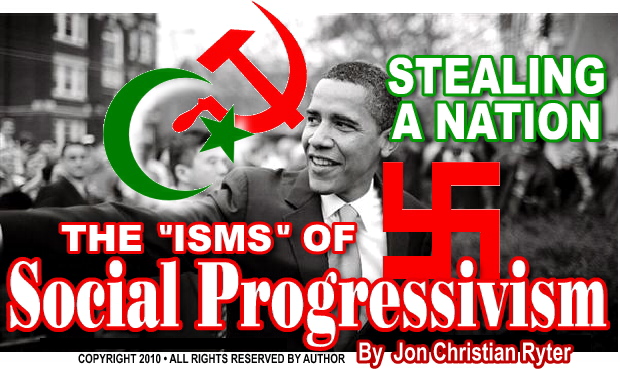
 he princes of industry and the barons of banking and business throughout the whole world will soon weep and mourn the collapse of the global fiat money system—Economic Babylon—because mankind will no longer have the financial wherewithal to buy the goods and services offered by the retail cabal. Their wares, from gold and silver to precious and semi-precious stones and pearls, and all kinds of expensive babbles from ivory to frankincense to luxury ointments and fine wines and oils to the luxurious commodities that the rich crave and the poor envy. When that time comes—sooner, I suspect, rather than later—the middle class will no longer be able to buy the fine center cuts of meat the butcher saves for them today. Nor will their neighborhood fish monger be saving them the freshest catch-of-the-day. Slightly rancid fish will be considered the prize "catch-of-the-day."
he princes of industry and the barons of banking and business throughout the whole world will soon weep and mourn the collapse of the global fiat money system—Economic Babylon—because mankind will no longer have the financial wherewithal to buy the goods and services offered by the retail cabal. Their wares, from gold and silver to precious and semi-precious stones and pearls, and all kinds of expensive babbles from ivory to frankincense to luxury ointments and fine wines and oils to the luxurious commodities that the rich crave and the poor envy. When that time comes—sooner, I suspect, rather than later—the middle class will no longer be able to buy the fine center cuts of meat the butcher saves for them today. Nor will their neighborhood fish monger be saving them the freshest catch-of-the-day. Slightly rancid fish will be considered the prize "catch-of-the-day."  Those consumers who are worrisomely standing in line in the meat market, will be there to barter for what filler scraps of beef, pork, lamb, or chicken that previously had been ground up and used to fill fresh frankfurters. If they're lucky, that's the meat they will bring home for tonight's stew. The merchant princess who prospered by selling their merchandise to customers with money in hand, will soon be standing afar off, wailing in anguish as the cyberwealth they created to replace the fiat currency that replaced the gold and silver they preferred to horde, suddenly vanished like a house of cards in a gale force wind.
Those consumers who are worrisomely standing in line in the meat market, will be there to barter for what filler scraps of beef, pork, lamb, or chicken that previously had been ground up and used to fill fresh frankfurters. If they're lucky, that's the meat they will bring home for tonight's stew. The merchant princess who prospered by selling their merchandise to customers with money in hand, will soon be standing afar off, wailing in anguish as the cyberwealth they created to replace the fiat currency that replaced the gold and silver they preferred to horde, suddenly vanished like a house of cards in a gale force wind.
In a cyberhour of time, the wealth accumulated by centuries-old dynasties will be gone; sucked into the bottomless cyber sinkhole called eternity that leads to Hell. And finally, for the first time since Adam walked, heavy-hearted and ashamed from the pristine Garden of Eden into a hostile world, man will discover that the Utopia he tried so hard to create was not a replication of God's Eden but of Satan's paradigm on Earth. At that moment, just for an instant, all men will be equal—but mankind will discover, much to their anguish and dismay, that they are a scant 42 months from being judged by their Maker just outside the East Gate of Jerusalem overlooking the Valley of the Son of Hinnom—from the Hebrew, Ge-Hinnon (or its Greek equivalent, Hades).
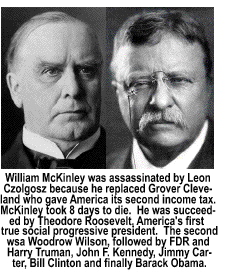 Global totalitarianism, fashioned surreptitiously by the social progressives over the last century, began with the premature birth of social progressivism in the United States on Sept. 14, 1901 when Vice President Theodore Roosevelt assumed the office of President upon the death of America's 25th President, William McKinley who was shot twice by a communist anarchist, Leon Czolgosz, at the Pan-American Exposition in New York on Sept. 6, 1901. McKinley died from gangrene on Sept. 14. Social Progressive Roosevelt became the 26th President of the United States an hour and 15 minutes after McKinley's death. Czolgosz was sentenced to death and executed by electrocution at Auburn Prison on Oct. 29, 1901.
Global totalitarianism, fashioned surreptitiously by the social progressives over the last century, began with the premature birth of social progressivism in the United States on Sept. 14, 1901 when Vice President Theodore Roosevelt assumed the office of President upon the death of America's 25th President, William McKinley who was shot twice by a communist anarchist, Leon Czolgosz, at the Pan-American Exposition in New York on Sept. 6, 1901. McKinley died from gangrene on Sept. 14. Social Progressive Roosevelt became the 26th President of the United States an hour and 15 minutes after McKinley's death. Czolgosz was sentenced to death and executed by electrocution at Auburn Prison on Oct. 29, 1901. 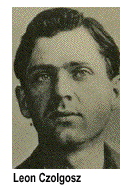 In his final public statement, Czolgosz said he killed McKinley because the president was an enemy "...of the good working [class] people." To make sure communists could not steal his body in order to make him a martyr, he was buried inside the prison grounds. Sulfuric acid was poured into his coffin before it was covered with dirt so that his body, which would be immediately, ghoulishly disfigured, would also begin to decompose within 12 hours of burial.
In his final public statement, Czolgosz said he killed McKinley because the president was an enemy "...of the good working [class] people." To make sure communists could not steal his body in order to make him a martyr, he was buried inside the prison grounds. Sulfuric acid was poured into his coffin before it was covered with dirt so that his body, which would be immediately, ghoulishly disfigured, would also begin to decompose within 12 hours of burial.
Today, under Barack Hussein Obama, social progressivism has finally become an economic millstone that has finally shackled every man, woman and child to an increasingly totalitarian State. America was effectively disarmed and dissuaded that communism was a threat since the very public, very phony coup d' etat of Soviet President Mikhail Gorbechev on Aug. 19, 1991, and the made-for-TV drama that same day when Boris Yeltsin climbed atop a Russian T-45 tank outside the Kremlin and faced-down the Central Committee which ostensibly staged the coup—an act that was conveniently videotaped for global consumption by CNN. The world watched what they were told was people in the second most authoritarian country in the world breaking the shackles of totalitarianism without a shot being fired. There was only one problem with the made for TV drama. It was a made for TV drama. The CNN filming took place during a news blackout when even telephones were theoretically shut off in Russia.
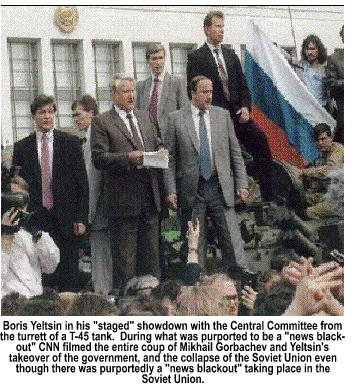 The Red Army theoretically repeated the Tiananmen Square Massacre on June 4, 1989 that began with bloodless protests on April 14, and tragically culminated with what is known in China as the June Fourth Movement when the People's Liberation Army crushed the freedom movement, killing several hundred Chinese civilians whose only crime was peaceful protest.
The Red Army theoretically repeated the Tiananmen Square Massacre on June 4, 1989 that began with bloodless protests on April 14, and tragically culminated with what is known in China as the June Fourth Movement when the People's Liberation Army crushed the freedom movement, killing several hundred Chinese civilians whose only crime was peaceful protest.
The Soviets have been convinced since the 1950s that communism would prevail and that the free enterprise system would ultimately collapse under the weight of its debt. On Nov. 16, 1956, 8 years before he was fired as Premier of the Soviet Union, Nikita Khrushchev told the American people that "...our firm conviction is that sooner of later Capitalism will give way to Socialism. Whether you like it or not, history is on our side. We will bury you." Later, he amended his statement, adding that the Soviets would not beat America in battle, but that :...the United States will eventually fly the communist flag—the American people will hoist it themselves."
In the spring of 1964 financier David Rockefeller went to Moscow to meet with Supreme Soviet head Leonid Brezhnev—where the two ostensibly talked about a wheat deal for Russia. When the meeting ended, the Central Committee agreed to fire Khruschev and retire him to his dacha—which they let him keep (for a year), with a 500 ruble a month pension (reduced to 400 rubles a month when his dacha was confiscated). People think of capitalism and socialism as opposite ends of the political spectrum. They aren't. Socialism is a political ideology. Capitalism is an economic system that controls a nation's trade and economic well-being. There are two forms of capitalism: free enterprise capitalism where the people are allowed to develop and grow wealth, and statist capitalism where those who control the government, and those closely aligned with them, are the only class of people legally allowed to accumulate wealth.
 Social progressivism did not begin in France. It actually started as an intellectual movement against Catholicism in England in 1688 with the overthrow of King James II of Scotland after the birth of his son, James Stuart, who would have been a Catholic monarch had he been allowed to ascend to the throne of England. The battle started when James II, a Catholic, inherited the throne in 1685. The Whigs, a minority in Parliament, fought to exclude James from the throne. James fought back by demanding that the English courts make a common law ruling that would allow him to enact what was called the Test Act , The Test Act would force public officials to pass a religious test to become eligible for public employment. James II planned to convert England into a Catholic nation like France.
Social progressivism did not begin in France. It actually started as an intellectual movement against Catholicism in England in 1688 with the overthrow of King James II of Scotland after the birth of his son, James Stuart, who would have been a Catholic monarch had he been allowed to ascend to the throne of England. The battle started when James II, a Catholic, inherited the throne in 1685. The Whigs, a minority in Parliament, fought to exclude James from the throne. James fought back by demanding that the English courts make a common law ruling that would allow him to enact what was called the Test Act , The Test Act would force public officials to pass a religious test to become eligible for public employment. James II planned to convert England into a Catholic nation like France.  This led to the English Revolution of 1688 and set the stage for the birth of Illuminism in Europe on May 6, 1776 through Johann Adam Weishaupt, a Jesuit philosophy and law professor at the University of Ingolstat in Germany. Weishaupt developed the concepts of social progressivism. The intellectual progressive movement known as Illuminism, or the Enlightenment, continued until the French Revolution when the crown heads of Europe realized that the new culture spawned by the aegis of reason fully intended to end the monarchies of Europe and form new philosophical systems based on social progressiveness.
This led to the English Revolution of 1688 and set the stage for the birth of Illuminism in Europe on May 6, 1776 through Johann Adam Weishaupt, a Jesuit philosophy and law professor at the University of Ingolstat in Germany. Weishaupt developed the concepts of social progressivism. The intellectual progressive movement known as Illuminism, or the Enlightenment, continued until the French Revolution when the crown heads of Europe realized that the new culture spawned by the aegis of reason fully intended to end the monarchies of Europe and form new philosophical systems based on social progressiveness.
Capitalism existed, in one form or another, as a economic system from the 14th century. It has existed as a political system since the end of the 18th century with the explosive growth of of a robust middle class in Europe and the American colonies. The middle class grew from an increase in trade between the craftsmen in the Old World and the tradesmen of the New World. Modern capitalism was viewed as a good thing for the developed nations of Europe, and the shareholders of the colonies in the New World. As the prosperity of the New World grew, the power of the Old World aristocracy began to wane. As the Age of the Renaissance ended, wars were increasingly fought over wealth and territory rather than political ideology. Nineteenth century Europe is remembered more for its wars than for the expansion of liberty since Europe has always been steeped in a parochial social progressivism that ultimately overwhelmed the aristocratic ruling class. The working class, which bought social progressivism as a political system that offered the working class equality discovered, in every totalitarian state that adopted its principles, they remained shackled to the bondage system into which they were born.
The American economic and political system is rooted in both the Declaration of Independence and in the Constitution of the United States. Based largely on the concept of the British Bill of Rights, James Madison insisted on adding a Bill of Rights to the Constitution in order to draw a very clear line in the sand. The Founding Fathers, using Emer de Vattel's legal philosophy, The Law of Nations created an entirely new system of governance which spells out the basis of liberty. In developing the verbiage of the Constitution, Madison fought with Federalist Alexander Hamilton who believed the well-born were entitled to privilege not provided to the working class. Hamilton fought to include a single paragraph preamble to spell out the purpose of the Constitution knowing, he explained in the Federalist papers, that down the road of time, legislators and liberal judges would come to view the preamble as an implied rights of the central government, opening the door for the social progressives to enact a social agenda so far out of the scope of its authority that no court should have allowed any portion of the New Deal to be enacted.
The preamble is 52 words that precedes any of the articles of the Constitution. There is nothing there that any lawyer or judge should trip over. It's merely a simple explanation of what the Constitution affirms to accomplish. It is not a rule of law. Nor is it a delegation of power. The preamble, which the liberal federal judiciary has codified as an implied right of the central government, simply says: "We the People of the United States, in order to form a more perfect Union, establish Justice, insure domestic tranquility, provide for the common defense, promote the general welfare, and secure the blessings of Liberty to ourselves and our Prosperity, do ordain and establish the Constitution of the United States of America." While every Constitutional lawyer will admit that the preamble does not grant any authority to anyone, they are equally quick to acknowledge that nor does it deny or prohibit any particular authority. It is not law. It is merely a stipulation that the government has no authority outside of what follows the preamble. The Federalists, on the other hand, felt the preamble was sufficient to function as the Bill of Rights. They did not think anything needed to be enumerated, believing the preamble defined the role of government and, as Federalists, didn't think the role of the citizen needed to be defined since it would become whatever government said it would be. That, by the way, is social progressivism at its finest.
In the 52 word preamble, Congress and the liberal federal court system decided that four words: promote the general welfare (that is not found in any of the Articles of the Constitution) allows Congress to assume the power to enact laws dealing with social justice even though the specific power to do so is denied them under the 10th Amendment. The problem the American people face over this four word clause is found in the UN Charter, Chapter XVI, Article 103 which states that the obligations of member States overrides the obligations citizens have to obey national laws that conflict with any article in the UN Charter, or laws which have been formerly adopted by the UN. The UN views the British Bill of Rights of 1689, from which the UN Universal Declaration of Human Rights and the UN Convention on Human Rights was crafted, supersedes the United States Bill of Rights and mandates that government is obligated to provide for the welfare of its people since those tenets are part and particle to the UN Charter and its amended documents.
To protect the new nation from the Old World banking families, the Founding Fathers established the principles of self-determination by constitutionally mandating the coining its own money from silver, gold and copper as a responsibility of Congress, not private bankers. In point of fact, the authority to coin money rested with the House of Representatives whose members had the shortest terms in office so the people could get rid of them quickly if they broke the public trust. Initially, the colonial dollar was the Spanish "Eight Reales" [pieces of eight]. It was the preferred form of currency during the Revolutionary War since, even if the colonies lost, the pieces of eight would be accepted as legal tender by England. Congress enacted a law in 1857 to ban to use of pieces-of-eight as legal tender.
Thus, not only did the Constitution provide a Bill of Rights which made the people co-equal with its government, it mandated a monetary system based on gold and silver that was controlled by the people through the House of Representatives which they controlled, and not the States. This was done because the people, not the State governments, were ultimately responsible for paying the debt incurred by the nation. (It should be noted that during the reign of Henry VIII from 1509 until his death in 1547, England debased their gold guineas by using a copper core and covering it with gold. Ultimately, as the coins circulated, the thin layer of gold wore off the copper cores became visible. The fiat coins were dubbed "red guineas". In 1558 Queen Elizabeth I launched an effort to recall the red guineas and replace them with solid gold coinage, restoring the prestige of the English monetary system.
Avarice, however, has no boundaries. In the case of Henry VIII, he debased his national currency out of greed. During the Election of 1892, the Populist Party (the Social Progressives). demanded universal labor unions, a national currency backed by at least 50% by silver (based on a 16-60-1 ratio of gold to silver), and a graduated federal income tax to provide social benefits for the American people and a law prohibiting non-US citizens from owning land or property in the United States. 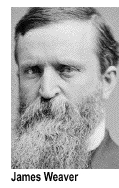 The Populist Party presidential candidate was James B. Weaver, who won 1,041,028 votes and took Colorado, Kansas, Idaho and Nevada and split the electoral votes in Oregon and North Dakota. Had Weaver not been in the race, Harrison would likely have won re-election with 6,217,136 to Cleveland's 5,556,918 votes. Cleveland took 277 electoral votes to Harrison's 145 and Weaver's 22. But, remember, without Weaver and the Social Progressives in the race, those votes would have gone to Harrison and not Morgan's man, Cleveland. Weaver's 1.047 million votes would likely have have flipped California, Texas, Illinois, New York and Wisconsin, and what was a major victory for Cleveland would have become a narrow win for Harrison. Cleveland, not Harrison, would gone down in history as the one-term president.
The Populist Party presidential candidate was James B. Weaver, who won 1,041,028 votes and took Colorado, Kansas, Idaho and Nevada and split the electoral votes in Oregon and North Dakota. Had Weaver not been in the race, Harrison would likely have won re-election with 6,217,136 to Cleveland's 5,556,918 votes. Cleveland took 277 electoral votes to Harrison's 145 and Weaver's 22. But, remember, without Weaver and the Social Progressives in the race, those votes would have gone to Harrison and not Morgan's man, Cleveland. Weaver's 1.047 million votes would likely have have flipped California, Texas, Illinois, New York and Wisconsin, and what was a major victory for Cleveland would have become a narrow win for Harrison. Cleveland, not Harrison, would gone down in history as the one-term president.
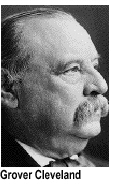 The Democrat, Cleveland, carried the water pail for the Populists, becoming a Social Progressive in 1893. In 1894 the Democrats thanked the Populists by enacting the Wilson-Gorman Tariff Act of 1894 which levied an income tax of 2% on all annual incomes over $4,000, taxing only the rich. Because the Democratically-controlled Congress levied an income tax against Americans, the voters rebelled against the Democrats and turned control of Congress over to the Republicans in November of that year. When the voters elected Ohio Senator William McKinley president, the social progressives saw their dream of a socialist Utopia end after one year. That was the reason Leon Czolgosz assassinated McKinley.
The Democrat, Cleveland, carried the water pail for the Populists, becoming a Social Progressive in 1893. In 1894 the Democrats thanked the Populists by enacting the Wilson-Gorman Tariff Act of 1894 which levied an income tax of 2% on all annual incomes over $4,000, taxing only the rich. Because the Democratically-controlled Congress levied an income tax against Americans, the voters rebelled against the Democrats and turned control of Congress over to the Republicans in November of that year. When the voters elected Ohio Senator William McKinley president, the social progressives saw their dream of a socialist Utopia end after one year. That was the reason Leon Czolgosz assassinated McKinley.
As America prospered, the princes of industry and the barons of banking and business whose own prosperity mushroomed from the expanding demand for their wares as the working class continued to expand and prosper. The aristocracy and the landed gentry ran for office and became the governors and the Congressmen and the US Senators. The State Houses became the domain for the rising middle class. As the professional class grew, the growing white collar middle class suddenly found it could compete politically with the aristocrats—not just for his seat in the US House and Senate, but in business. At the conclusion of the Rent Wars, which the landed gentry lost in the North, the rich felt threatened by the working class and decided it was time to erect some boundaries working class political candidates would have trouble crossing.
 The birth of modern social progressivism came through Karl Marx who argued that the structural contradictions of capitalism would bring about its own collapse. Socialism, he predicted, would replace capitalism. The fact is, socialism robs personal initiative since under socialism there is no incentive to work. Thus, socialism will always erode macro-economics stability. Under socialism, or better yet, under social progressivism only the rich, and those they favor, profit financially. Under socialism the masses are reduced to medieval serfdom where all of those "equal people" live in the perpetual squalor of generational poverty.
The birth of modern social progressivism came through Karl Marx who argued that the structural contradictions of capitalism would bring about its own collapse. Socialism, he predicted, would replace capitalism. The fact is, socialism robs personal initiative since under socialism there is no incentive to work. Thus, socialism will always erode macro-economics stability. Under socialism, or better yet, under social progressivism only the rich, and those they favor, profit financially. Under socialism the masses are reduced to medieval serfdom where all of those "equal people" live in the perpetual squalor of generational poverty.
In 1901 America erred. When President McKinley died, Republican Vice President Theodore Roosevelt, a social progressive, ascended to the White House. Roosevelt arrived at 1600 Pennsylvania Avenue at a time when the working class was becoming increasingly enamored with the illuministic philosophy that society could, and should, be completely classless. No kings. No lords. No special classes of people. Just plain ordinary men and woman. All working according to their ability and sharing according to their need. The philosophy, preached by labor leaders, politicians and even church leaders, sounded good. It sounded fair. It sounded equal. 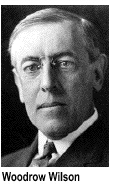 It sounded American. At least, the way the social progressive preached it. Roosevelt's affinity for socialism came into the open in 1912 when JP Morgan convinced him to run as a third party candidate against William Howard Taft to guarantee that his own social progressive, Thomas Woodrow Wilson—who promised Morgan his own central bank in America—would win. The honest in-house polls showed Taft beating Wilson 55% to 45%. Most Americans today think of Teddy Roosevelt as running for President on the BullMoose Party ticket. He actually ran on the Progressive Party ticket. Like Barack Obama in 2008, Teddy Roosevelt ran on an ambitious program of economic, social and political change. He promoted "new nationalism," and promised to change the concepts of constitutional government by creating a balance between democracy and social justice which he referred to in campaign speeches as "pure democracy." Using slightly different words, Obama promised precisely the same change. In 2009, the American people should have understood that social progressiveness is just plain old totalitarian communism. In 1912, the Bolshevik Revolution was still 5 years off and all socialism meant to most Americans was that you favored labor unions.
It sounded American. At least, the way the social progressive preached it. Roosevelt's affinity for socialism came into the open in 1912 when JP Morgan convinced him to run as a third party candidate against William Howard Taft to guarantee that his own social progressive, Thomas Woodrow Wilson—who promised Morgan his own central bank in America—would win. The honest in-house polls showed Taft beating Wilson 55% to 45%. Most Americans today think of Teddy Roosevelt as running for President on the BullMoose Party ticket. He actually ran on the Progressive Party ticket. Like Barack Obama in 2008, Teddy Roosevelt ran on an ambitious program of economic, social and political change. He promoted "new nationalism," and promised to change the concepts of constitutional government by creating a balance between democracy and social justice which he referred to in campaign speeches as "pure democracy." Using slightly different words, Obama promised precisely the same change. In 2009, the American people should have understood that social progressiveness is just plain old totalitarian communism. In 1912, the Bolshevik Revolution was still 5 years off and all socialism meant to most Americans was that you favored labor unions.
Wilson, a Democrat, the designated winner of the Election of 1912 would be the second Social Progressive to win the the presidency. Wilson won because JP Morgan bought the White House for him. Morgan needed three things from him. First, Wilson assured Morgan that if Congress enacted what would become the Federal Reserve Act (which was written by Assistant Treasury Secretary Abraham Piatt Anderson, Henry P. Davidson, senior partner of JP Morgan, Charles D. Norton, president of Morgan's First National Bank of New York, Benjamin Strong, President of the John D. Rockefeller, Sr., owned Bankers' Trust Company, Frank A. Vanderlip, president of the Rockefeller-owned National City Bank of New York, Paul Moritiz Warburg, senior partner of Rothschild-owned Kuhn, Loeb & Company, and Senator Nelson Aldrich [R-RI], father-in-law of John D. Rockefeller, Jr.) he would sign it into law.
The Federal Reserve Act was written by this group, known historically as the Jekyll Island Seven, at Aldrich's retreat on Jekyll Island off the coast of Brunswick, Georgia. The Republican-controlled Congress gave JP Morgan an early Christmas present in 1913. On Dec. 23, Wilson signed the Federal Reserve Act into law, giving the transnational banking families of the world their private central bank in the United States. Nontransferable shares of the Fed are owned by the following European and American families: Astor [Am], Baring [Eu], Walter Burns [Am], Carnegie [Am], John W. Davis [Am], Clinton Dawkins [Am] , Dillon [Am], John Foster Dulles [Am], DuPont [Am], Erlanger [Eu], Fould [Eu], S. Parker Gilbert [Am], Edward Grenfeld [Am], Gould [Eu], Kuhn, Lazard [Eu], William Leffingwell [Am] , Loeb [Eu], Mallet [Eu], McCormick [Am], Mellon [Am], Milner [Eu], Mirabaud [Eu], Morgan [Am], Nobel [Eu], Rhodes [Eu], Elihu Root [Am], Rockefeller [Am], Rothschild [Eu], Schneider [Eu], Schroder [Eu], Selignman [Eu], Spreyers [Eu], and Vanderbilt [Am]. (Note: in a few instances I included the first name of the individuals only because they are so obscure and are never associated with real wealth, that even the mention of their family names would have triggered no recognition.) Real wealth is invisible. The richest men in the world never appear on any of the lists of the world's wealthiest people.
In addition to the Fed, Morgan was having troubling getting the States to ratify the 16th and 17th Amendments. The States were convinced the federal government did not possess the right to tax the people of the sovereign States. That was a right that belonged solely to the Stat legislators. Even more, the States knew the 17th Amendment would eliminate their voice in the federal government since the Senators would no longer be elected by the State legislators, nor would they be beholden to their governors for their jobs.
The States, since 1833, prevented the re-establishment of a central bank in the United States since Nicholas Biddle's attempt to recharter the 2nd National Bank of the United States four year early, in 1832. The bankers did not get their central bank until the fraudulently ratified 17th Amendment removed the US Senate from the control of the States and gave it to the K Street lobbyists in Washington, DC where legal bribes are readily dispersed by the bagmen of the princes of industry, and the barons of banking and business.
Wilson also attempted to secure a resolution for an 18th Amendment that would have removed the US monetary system from the gold standard. That resolution, first attempted in 1907 failed again in 1913. 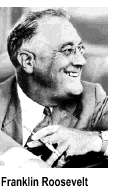 Franklin D. Roosevelt, Teddy's cousin, and the third social progressive to make it into the White House, tried as well. FDR was stopped cold by Sen. Carter Glass [D-VA] who assured Roosevelt the New Deal would end the very instant anyone offered a Constitutional amendment to remove the US monetary system from the gold standard. Believing Glass' threat, Roosevelt, who needed to remove our monetary system from the gold standard, did the next best thing. Congress simply removed the gold clause from all private and public contracts, and removed from our currency the phrase "payable in gold coin to the bearer on demand." Silver certificates were also no longer redeemable in silver coinage. The New Deal Congress—which, like Obama's 111th Congress, had a super majority in both Houses—legalized Roosevelt's actions without a single Republican vote. They passed the Congressional Gold Repeal Joint Resolution that allowed Roosevelt to remove the gold clause from our money after-the-fact. Republicans took FDR to court (294 US 240), but in a 5-to-4 decision, the court ruled that only because of the national emergency (Obama calls it a national crisis), the court felt obligated to protect the economy even though they knew what they were doing was unconstitutional.
Franklin D. Roosevelt, Teddy's cousin, and the third social progressive to make it into the White House, tried as well. FDR was stopped cold by Sen. Carter Glass [D-VA] who assured Roosevelt the New Deal would end the very instant anyone offered a Constitutional amendment to remove the US monetary system from the gold standard. Believing Glass' threat, Roosevelt, who needed to remove our monetary system from the gold standard, did the next best thing. Congress simply removed the gold clause from all private and public contracts, and removed from our currency the phrase "payable in gold coin to the bearer on demand." Silver certificates were also no longer redeemable in silver coinage. The New Deal Congress—which, like Obama's 111th Congress, had a super majority in both Houses—legalized Roosevelt's actions without a single Republican vote. They passed the Congressional Gold Repeal Joint Resolution that allowed Roosevelt to remove the gold clause from our money after-the-fact. Republicans took FDR to court (294 US 240), but in a 5-to-4 decision, the court ruled that only because of the national emergency (Obama calls it a national crisis), the court felt obligated to protect the economy even though they knew what they were doing was unconstitutional.
On Jan. 4, 1934 Congress illegally enacting the Gold Reserve Act of 1934. The Gold Reserve Act allowed FDR to devalue its new fiat money, which he did. The one dollar bill, which previously was worth 100¢ was suddenly worth 41¢ in a form of taxation—inflation. Where Wilson committed the sin of destroying the separation of powers, FDR committed an even worse sin. He created, on his own, a 4th branch of government that was allowed to "fill in the holes," by interpreting what the laws meant (even if the wording suggested they meant something else), and prescribe both the civil and criminal penalties for violating them—and yet, the bureaucracy was accountable to no one even though each bureau chief reported to a congressional committee which was theoretically responsible for their conduct and activities. The bureaucracy, wholly a part of the Executive branch, which has no constitutional authority to legislate or adjudicate was granted both by the New Dealers, and without regard for due process under the Bill of Rights, used their powers to seize the assets of those suspected of violating criminal or civil law or petty regulations.
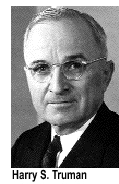 Roosevelt, like Harry S. Truman and the other Social Progressives who preceded and followed him, had one common trait. They were all globalists. All of them believed in world government. Only one of them, John F. Kennedy, could be described as a free enterprise capitalist. The rest of them were all statist capitalisfs who believed that the small cabal of men who controlled the government should also control the money. Unlike his more high profile Oval Office predecessors, Truman's social progressivism did not make its grand appearance on center stage until he addressed the UN General Assembly on Oct. 24, 1950 and made this simple statement that few newspapers in the United States printed: "The [US soldiers] who died in Korea died in order that the United Nations might live." With the building of the Iron Curtain and the Berlin Wall, Americans quickly saw communism as a threat to liberty, and the most high profile communists carryovers from the Roosevelt Administration were quickly jettisoned by Truman in self defense. Those who hid their affinity for communism remained and ultimately became entrenched career employees within the bureaucracy.
Roosevelt, like Harry S. Truman and the other Social Progressives who preceded and followed him, had one common trait. They were all globalists. All of them believed in world government. Only one of them, John F. Kennedy, could be described as a free enterprise capitalist. The rest of them were all statist capitalisfs who believed that the small cabal of men who controlled the government should also control the money. Unlike his more high profile Oval Office predecessors, Truman's social progressivism did not make its grand appearance on center stage until he addressed the UN General Assembly on Oct. 24, 1950 and made this simple statement that few newspapers in the United States printed: "The [US soldiers] who died in Korea died in order that the United Nations might live." With the building of the Iron Curtain and the Berlin Wall, Americans quickly saw communism as a threat to liberty, and the most high profile communists carryovers from the Roosevelt Administration were quickly jettisoned by Truman in self defense. Those who hid their affinity for communism remained and ultimately became entrenched career employees within the bureaucracy.
Like Roosevelt, Truman also attempted to create an Obama-style national healthcare system within the Social Security System—only far more aggressive...and minus the Death Board. It is important to note that when Roosevelt was president, the life expectancy of a male in 1932 when Social Security was enacted was 58.1 years of age. Since the worker could not begin to collect full benefits until age 65, only a handful of wage earners were expected to live longer enough to collect benefits. Their spouses, who would likely live to reach 61.6 years of age would almost make it.
In 1940, the majority of husbands and wives who paid into the system would still have died before they reached 65. The only benefit they would have collected would have been the $250 death benefit. Had they lived until the 1950s, the average male recipient of Social Security would likely have collected benefits for six months since the average death age of a male in the United States was 65.5 years. His wife would have survived him by 5.5 years. The problem for Uncle Sam began in 1997 when the average lifespan of a man increased to 73.1 years. His wife would likely survive him by about six years. In 2009, man's average lifespan increased to 78.11 years. With an old age pension system that expected its recipients to die before they collected any benefits, or with only about 25% of them living long enough to collect benefits, having recipients collect benefits for one or decades was more than the system could tolerate. The odds no longer favor "the house."
Truman, the next Social Progressive to inherit the White House did so on the death of Roosevelt on April 14, 1945. On Nov. 19 he launched his plan to implement a new national healthcare. (Every Social Progressive tries to enact a healthcare plan. Is it because they are concerned about the welfare of the people? No. They do so because this is the master tax plan of Utopia. Not only do you get to control all of the wealth owned by everyone, you get to control whether nor not, or precisely when, they die.)
Like FDR, Truman made the same bet that he could enact socialized medicine. Only, Truman was even more aggressive than FDR or anyone who followed. His program would be a five-pronged attack on healthcare—and the taxpayers who would be expected to foot the bill.
First, Truman decided that every community in America should be able to provide the same quality of medicine as every other community. The first prong of his socialization of medicine was to fund the pay difference between a rural doctor, nurse or dentist with a metropolitan doctor, nurse or dentist with tax dollars. Second, Truman decided to build between 1,200 to 1,500 new hospitals so that every community in the nation had their own healthcare facility. Tax dollars would build and staff the hospitals. That was to make sure the standard of care at the hospital in Tebo Junction, Arkansas was as good as the standard of care at the Mayo Clinic or Johns Hopkins.
Third, Truman planned to establish national standards of health care, and enforce them by law. Fourth, to administer the national standards, Truman proposed boards in every medical specialty to make sure that the heart bypass done in Tupelo, Mississippi was done exactly the same way a heart bypass was done at the Cleveland Clinic or Georgetown University Hospital in Washington, DC. (This feature was incorporated in the failed Hillary Clinton Health Security Act of 1993.) And, the fifth part of the Truman healthcare plan was to provide free medical care for every man, woman and child in the United States. What the bureaucrats didn't like about the Truman plan was that it would be optional.
Truman's plan went to Congress as an expansion of Social Security. The bill was co-sponsored by Senators Robert Wagner [D-NY] and James Murray [D-MT]. The House version was sponsored by one Congressman, John Dingell [D-MI]. The bill was viciously attacked as socialist stupidity by the American Medical Association which characterized the legislation as a "communist bill," thus, the term "socialized medicine. " In press conference after press conference, the AMA told the American people that the Truman White House staffers "...were followers of the Moscow party line." There was more truth than fiction in that statement.
Sixty-two key FDR staffers—all of whom were retained by Truman—were card-carrying communists. Among them were: Adolph Berle, Jr. Assistant Secretary of State; Frank Berman, Dept. of Commerce; Benjamin Cohen, Executive Advisor to Roosevelt; Abe Fortas, General Counsel, FEA (and later, Lyndon Johnson's confirmed appointee to the US Supreme Court; Nathan Golden, Chief of the Motion Picture Industry Committee in the Commerce Dept.; Harold Ickes, Secretary of the Interior (and father of the current Harold Ickes who served in both the Clinton and Obama Administrations); Henry J. Morganthau, Jr., Secretary of the Treasury; Harold Nathan, Assistant Director of the FBI; Frances Perkins, Secretary of Labor; Harry Dexter White, Assistant Secretary of Treasury; and some 51 others, all identified by their confidential communications with the Soviets as agents of the Soviet government in secret Gestapo files which were surrendered to the OSS (what evolved into the CIA) by Gestapo chieftain Heinrich Muller in 1948 when Muller was attempting to keep from being turned over to the Soviets who wanted to silence him forever.
Included in the materials surrendered to the US government was a a telephone conversation that took place between FDR and British Prime Minister Winston Churchill on Nov. 26, 1941 when Churchill advised Roosevelt that the Japanese fleet was headed to Pearl Harbor and planned an aerial attack on Monday, Dec. 8 (Tokyo time), which would have been Sun., Dec. 7 Hawaiian time. 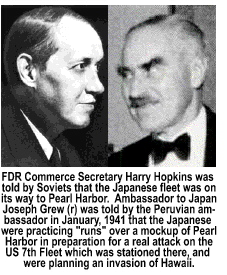 In order to place the United States squarely into both theaters of war in World War II, FDR agreed to get out of Washington for a few days and "be surprised" when the attack happened. Roosevelt got on his special presidential train and headed to Warm Springs, Georgia for a belated Thanksgiving holiday. Sadly for the FDR-Churchill plan, the Soviet Embassy warned communist-consort and FDR Secretary of Commerce Harry Hopkins of what they believed was the impending invasion of Hawaii by the Japanese. Hopkins told the Joint Chiefs who called FDR and interrupted his vacation with the shocking news. FDR was forced to hurry back to Washington. History treats that incident as the first inkling that the Japanese were planning to attack the US forces in Hawaii. It wasn't. Roosevelt was warned on Jan. 27, 1941 by Joseph Crew, the Ambassador to Japan, that a plan to cripple the US military at Pearl Harbor was being formulated. Crew was given the information by the Peruvian ambassador. Roosevelt ignored the warnings because, diplomatically, he was doing everything he could to provoke the Japanese into attacking. He froze all Japanese assets in the United States by presidential decree and placed an embargo on all iron, steel or even scrap metal to Japan. But more devastating to the Japan, which has only a small handful of oil and natural gas, Churchill and FDR made it impossible for Japan to purchase either from any ally of the West. War was necessary to transform the ineffective League of Nations into the United Nations.
In order to place the United States squarely into both theaters of war in World War II, FDR agreed to get out of Washington for a few days and "be surprised" when the attack happened. Roosevelt got on his special presidential train and headed to Warm Springs, Georgia for a belated Thanksgiving holiday. Sadly for the FDR-Churchill plan, the Soviet Embassy warned communist-consort and FDR Secretary of Commerce Harry Hopkins of what they believed was the impending invasion of Hawaii by the Japanese. Hopkins told the Joint Chiefs who called FDR and interrupted his vacation with the shocking news. FDR was forced to hurry back to Washington. History treats that incident as the first inkling that the Japanese were planning to attack the US forces in Hawaii. It wasn't. Roosevelt was warned on Jan. 27, 1941 by Joseph Crew, the Ambassador to Japan, that a plan to cripple the US military at Pearl Harbor was being formulated. Crew was given the information by the Peruvian ambassador. Roosevelt ignored the warnings because, diplomatically, he was doing everything he could to provoke the Japanese into attacking. He froze all Japanese assets in the United States by presidential decree and placed an embargo on all iron, steel or even scrap metal to Japan. But more devastating to the Japan, which has only a small handful of oil and natural gas, Churchill and FDR made it impossible for Japan to purchase either from any ally of the West. War was necessary to transform the ineffective League of Nations into the United Nations.
When the Democratic Party resorts to creating its own opposition candidate to drain votes not from their candidate but from the Republican Party's choice, you know you have a candidate that even the Democrats know their own party won't buy even when they have a majority of the registered voters. 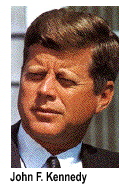 That happened when young, handsome, womanizing John F. Kennedy was fighting Sen. Hubert Humphrey [D-MN] and Gov. Adlai Stevenson [D-IL], Sen. Lyndon B. Johnson [D-TX] and Sen. Stuart Symington [D-MA] for the Democratic nomination. It was a three-way race between Kennedy, Humphrey and Johnson. The popular favorite was Stevenson who lacked the machine backing controlled by Johnson and the party backing held by Humphrey. The Social Progressives, controlled at that time by Eleanor Roosevelt, backed Kennedy, the Catholic.
That happened when young, handsome, womanizing John F. Kennedy was fighting Sen. Hubert Humphrey [D-MN] and Gov. Adlai Stevenson [D-IL], Sen. Lyndon B. Johnson [D-TX] and Sen. Stuart Symington [D-MA] for the Democratic nomination. It was a three-way race between Kennedy, Humphrey and Johnson. The popular favorite was Stevenson who lacked the machine backing controlled by Johnson and the party backing held by Humphrey. The Social Progressives, controlled at that time by Eleanor Roosevelt, backed Kennedy, the Catholic. 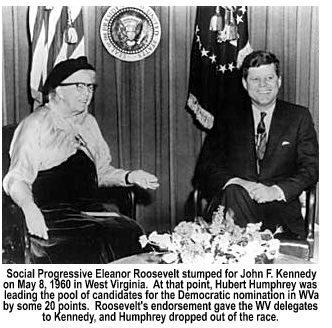 Had Stevenson somehow won the nomination, it would have been an overwhelming victory for the Democrats, particularly against Vice President Richard M. Nixon. In a recasting of 1948 with former New York Gov. Thomas E. Dewey running against him, it would likely have been a photo finish with Stevenson winning only because a Republican had occupied the White House for 8 years.
Had Stevenson somehow won the nomination, it would have been an overwhelming victory for the Democrats, particularly against Vice President Richard M. Nixon. In a recasting of 1948 with former New York Gov. Thomas E. Dewey running against him, it would likely have been a photo finish with Stevenson winning only because a Republican had occupied the White House for 8 years.
Kennedy led the list of potential nominees in the early primaries. Johnson, trying to engineer a come from behind victory, resorted to the use of dirty politics to unseat Kennedy. Johnon's campaign team set up phone banks in the Johnson Machine offices in Alice, Texas to raise the question in the minds of voters whether they could risk having a president who was taking his marching orders from the Vatican. But instead of Johnson's efforts helping the Texan, four weeks before the West Virginia primary on May 10, 1960, Humphrey leapfrogged everyone and, going into the West Virginia primary, led Kennedy by 20 points. Kennedy needed West Virginia to win the nomination. Without it, it would be an open convention and Johnson's machine would likely control it. Eleanor Roosevelt, the unofficial head of the Social Progressives went to West Virginia and campaigned in the coal fields for Kennedy. FDR. Jr. campaigned with him. Kennedy won West Virginia. In the evening on May 10, when the West Virginia votes were tallied, Humphrey dropped out of the race and pledged his delegates to Kennedy.
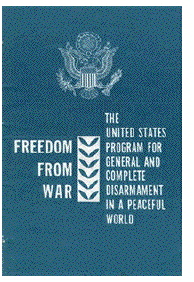 Presumptive Democratic nominee Kennedy met with the Council on Foreign Relations and pledged two things. First, he pledged to disarm the American people. Then, he pledged to disarm the world. The program was outlined in State Dept. Publication 7277. The CFR placed four key people on the Kennedy team.
Presumptive Democratic nominee Kennedy met with the Council on Foreign Relations and pledged two things. First, he pledged to disarm the American people. Then, he pledged to disarm the world. The program was outlined in State Dept. Publication 7277. The CFR placed four key people on the Kennedy team. 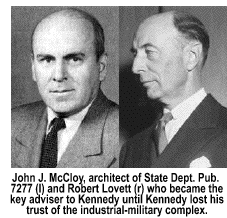 The most important of these would be Robert A. Lovett, who served as Truman's Defense Secretary and later as his Undersecretary of State. Lovett was offered any cabinet position he wanted in the Kennedy Administration. He turned them all down in favor of the role of invisible adviser. Lovett and John J. McCloy, who would create the US Arms Control and Disarmament Agency. Both were key members of the CFR member. Both were assigned a special job by the CFR. Their job was to structure the formula for disarming the world—beginning with the United States. The other two CFR members were Dean Rusk, who became Secretary of State and Robert McNamara who headed Defense. After the aborted Bay of Pigs invasion, Kennedy no longer trusted any of his CFR handlers, but he was stuck with them.
The most important of these would be Robert A. Lovett, who served as Truman's Defense Secretary and later as his Undersecretary of State. Lovett was offered any cabinet position he wanted in the Kennedy Administration. He turned them all down in favor of the role of invisible adviser. Lovett and John J. McCloy, who would create the US Arms Control and Disarmament Agency. Both were key members of the CFR member. Both were assigned a special job by the CFR. Their job was to structure the formula for disarming the world—beginning with the United States. The other two CFR members were Dean Rusk, who became Secretary of State and Robert McNamara who headed Defense. After the aborted Bay of Pigs invasion, Kennedy no longer trusted any of his CFR handlers, but he was stuck with them.
The Social Progressives believed the United States had to lead by example. If the United States completely disarmed itself, they reasoned, the Soviet Union and Red China would have nothing to fear, and would then willingly disarm as well. In reality, as history proved in 1939, what would happen would have been a lightning swift invasion, and conquest, of North America.
When the League of Nations members disarmed themselves in 1925-30 under the disarmament rules penned into the Article 20 of the Treaty of Versailles (the League of Nations Charter), three nations began to amass a war armada, first covertly, then openly—challenging the now weaponless nations of Europe to stop them. The belligerent nations were the Soviet Union, Germany and Japan. Had the United States not possessed the industrial strength it had at the time (but no longer possesses), Germany would have easily conquered all of Europe and Japan would have easily conquered all of Asia. The Fortress of Liberty would have fallen, with Japan invading North America from the Pacific and through Canada and Germany invading from the Atlantic and through Mexico.
Kennedy's social progressive role was to prepare the American people for the soon-coming world government which was to take place within two decades. Once the nations of Earth were disarmed and the planned global economy and unified banking system brought prosperity to the emerging economies, war—or at least global war—would be virtually impossible since the economies of all the nations of the world would be so interlocked, that if one of them collapsed, all of them would collapse.
Call this the economic version of MAD (mutually-assured destruction) which the world's best military minds were convinced would prevent a nuclear war since every nuclear power had the capability, even after they were largely annihilated, to destroy their destroyers. Thus, a nuclear strike against one nuclear power would assure the destruction not only of the attacker, but very likely, all of the remaining nuclear powers. Furthermore, since a nuclear holocaust will trigger a nuclear winter that will blanket out the sun for decades and ultimately kill almost all plantlife on Earth—not to mention the radiation that would kill a majority of the world's population that lived in the heaviest radiation zones—MAD was viewed as the safest deterrent to nuclear war.
That is, until the advent of the Islamic extremists and suicide terrorism. For decades the most unthinkable fear of the industrialized world was that Islamic jihadist extremists would get their hands on nuclear weapons or the ability to weaponize enriched uranium or plutonium.
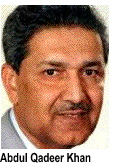 Both happened through the same man, Abdul Qadeer Khan, a nuclear technician who worked for the Netherlands government when they were building their first nuclear weapon. The Dutch should never have allowed a radical Muslim "technician" anywhere near a facility producing a nuclear weapon, but they did. Khan, known as the "father of Pakistan's nuclear weapon technology" is not a scientist. He's a thief. Over a period of time Khan managed to steal all of the Dutch blueprints to build a nuclear weapon and smuggled them out of the Netherlands.
Both happened through the same man, Abdul Qadeer Khan, a nuclear technician who worked for the Netherlands government when they were building their first nuclear weapon. The Dutch should never have allowed a radical Muslim "technician" anywhere near a facility producing a nuclear weapon, but they did. Khan, known as the "father of Pakistan's nuclear weapon technology" is not a scientist. He's a thief. Over a period of time Khan managed to steal all of the Dutch blueprints to build a nuclear weapon and smuggled them out of the Netherlands.
Khan's latest customer is Iran. When Iran is able to produce nuclear weapons in volume and has the capability to attach them to reliable, accurate missile systems, they will unhesitatingly use nuclear weapons not only against its first target, Israel, but against the United States, Canada, England, France and Italy: the nations construed by the Muslim world as the biggest threat against Islam—the Christian nations. Knowing this, the princes of industry, and the barons of banking and business whose lives evolve around wealth and the love of money sadly believe that everyone else in the world feels the same way about money they do.
They simply don't understand the jihadic mentality of the Muslims who are determined to kill or convert everyone in the world who is not Muslim. To the ideological zealots, wealth serves only to buy the weapons they need to kill their enemies. The Social Progressives still remain convinced that the Muslim world will not sacrifice the oil revenues they receive from the industrialized nations by waging nuclear jihad against them. That's why the princes of industry hang "do not drill" signs on every new oil or natural gas find in the United States. They believe as long as the Muslim world profits from US industry, they will be less inclined to destroy it. The Muslim's couldn't care less. They have been waging a 3,000 year Jihad against the world of the infidels and they have no intention of stopping until the enemy is beheaded or converted to Islam. Yet, the Social Progressives still believe they can trust the Muslims, and they are working hard to convince the Muslims that they can trust the Social Progressives.
John F. Kennedy learned the fallacy of the Social Progressive argument in 1961 when the CIA convinced him the Bay of Pigs was an essential military operation to protect the Monroe Doctrine. It was an embarrassing fiasco for the new president. It took the Kennedys several months to piece together enough data to realize the project was deliberately staged by the CIA, which was taking their marching orders from the CFR, to fail. The purpose? Ultimately, to justify Castro's asking the Soviet Union to bring troops into the western hemisphere to protect Castro's regime from Kennedy.
A US Navy F-8 Crusader photographed what the pilot believed were missile bases being built in Cuba. The CIA assured Kennedy what they were seeing in the spy photos were not missiles. Kennedy authorized several U-2 flghts over Cuba. The first flight, on Sept. 6 revealed a consignment of SS-4 medium-range ballistics missiles being offloaded from a Soviet ship. A second consignment of MRBMs arrived on Sept. 16. The U-2s photographed the construction of 9 missile sites, 6 for SS-4s and 3 for SS-5s. These were "first strike" launchers with a range of 2,400 miles. Castro and the Soviets could reach just about any target in the United States they wanted to hit.
Kennedy demanded that the Soviets dismantle the missile silos and remove all nuclear weapons from Cuba. The Soviets were convinced that the Social Progressives in the Kennedy Administration would ultimately do nothing, and the missile bases would become a permanent fixture in the Western Hemisphere. The American people would soon be going to bed at night with Soviet nuclear missiles aimed at their country.
After examining a month's worth of U-2 photos with his brother and his closest advisers, Kennedy convened a meeting with the 14-member Executive Committee of the National Security Council at 9 a.m. on Oct. 16 to examine the pictures and see if the "experts" saw what the CIA said did not exist. The CIA insisted there were no nuclear missiles in Cuba. But, if you recall, in 1961 the CIA had a fool proof plan to overthrow Castro that could not fail—until Kennedy learned after-the-fact that the "patriots" who invaded Cuba through an impenetrable swamp were armed with weapons of one caliber and given ammunition for entirely different weapons. Kennedy didn't trust the CIA.
In this instance, Defense Secretary McNamara sided with the CIA.. The missile system, they insisted, posed no threat to the United States. Kennedy and his brother, the Attorney General, didn't believe them. Neither did the Joint Chiefs. The US Navy blockaded Cuba and threatened to launch an attack on the nine missile sites if they were not dismantled, put back on the Soviet ship and returned to Russia. At 7 p.m. on Oct. 22 Kennedy said: "It shall be the policy of this nation to regard any nuclear missile launched from Cuba against any nation in the Western Hemisphere as an attack by the Soviet Union on the United States, requiring a full retaliatory response upon the Soviet Union." The following day, the Joint Chiefs took the Strategic Air Command to DEFCON 2, the only time in US history this has happened. The message was transmitted uncoded to make sure Soviet intelligence got the message. The crisis ended after 13 days, on Oct. 28 when Khrushchev announced that the Soviet government was going to dismantle the missile systems and remove them from Cuba.
Kennedy, who became more popular with the people, lost his value to the Social Progressives on the same day. One year and 25 days later, on Nov. 22, 1963, the princes of industry corrected the Election of 1960 in Dallas, Texas. Unknown to them, a second plot to assassinate Kennedy by a second group of people not linked to the first group was underway at precisely the same place and at precisely the same time. Lee Harvey Oswald was shot to death by Jack Ruby not because he killed Kennedy but because he did not.
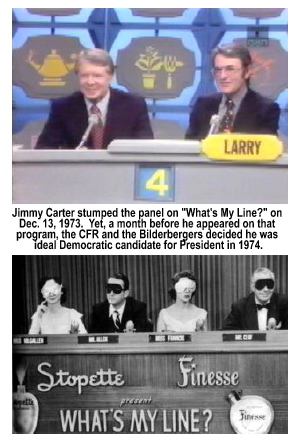 In July, 1964, David Rockefeller met with Khrushchev for two and a half hours before visiting the Central Committee of the Supreme Soviet to talk about importing grain from the West due to the drought in the Ukraine, the Soviet grain belt. On Oct. 14, 1964 Nikita Sergeyevich Khrushchev was fired. Both antagonists of the Missile Crisis had been removed from power. World government still remained tomorrow's dream for the social progressives.
In July, 1964, David Rockefeller met with Khrushchev for two and a half hours before visiting the Central Committee of the Supreme Soviet to talk about importing grain from the West due to the drought in the Ukraine, the Soviet grain belt. On Oct. 14, 1964 Nikita Sergeyevich Khrushchev was fired. Both antagonists of the Missile Crisis had been removed from power. World government still remained tomorrow's dream for the social progressives.
In 1973 when CFR-member Gov. Jimmy Carter [D-GA] contemplated throwing his hat in the ring to unseat the United States' first appointed president, Gerald Ford in 1976, he sought the backing of the CFR . 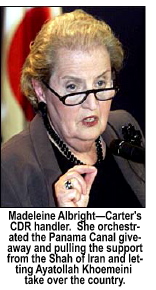 The CFR liked Carter because he was the perfect political chameleon. He was an ardent Social Progressive who would appeal to Bible Belt conservatives.
The CFR liked Carter because he was the perfect political chameleon. He was an ardent Social Progressive who would appeal to Bible Belt conservatives.
On December 13, 1973, the man who wanted to become the 39th President of the United States appeared on the popular TV show, What's My Line? and stumped the panel. A week or two prior to his prime time TV appearance Carter met with CFR Chairman David Rockefeller in London, England where the key European globalists endorsed Carter to replace Ford. Carter was assigned a CFR handler, Madeleine Albright. Carter became the worst president in the history of the United States until the advent of America's first illegal alien head-of-state, Barack Obama. Through his CFR handlers Carter helped the communist Daniel Ortega take over in Nicaragua and on the advise of Albright, Rockefeller and a group of the nation's largest bankers, Carter agreed to surrender the Panama Canal to the Panamanian government in 1999 to provide them with the revenue stream they needed to pay of $14 billion in loans supplied by those very banks to Panama.. And, finally, Carter altered the balance of power in the Mideast by helping Islamic extremists overthrow the pro-Western Iranian Shah Muhammed Riza Pahlavi and putting into power Ayatollah Ruhollah Khoemeini. Khoemeini's return set into motion the current problems with a nuclear Iran we face today. But Carter's worst sin was never revealed.
As the United States spiraled into hyperinflation, President Jimmy Carter agreed to surrender America's role as the holder of the world's "reserve currency" to the central bankers of the world who planned to use a basket of 4 currencies controlled by the International Monetary Fund to replace the US dollar as the world's "reserve currency." (That basket of currencies grew from 4 to 16 and is now 24.)
Had Jimmy Carter—who was deliberately destroying the US economy by creating a financial crisis severe enough to force the implementation of the plans of the CFR, the Bilderbergers and the IMF—been re-elected, a global monetary unit would have been replaced the dollar within a year without the need to first regionalizing the world's currencies in a multi-step process before collapsing them into a single global unit.
Had Ronald Wilson Reagan, the man who was supposed to lose in the primary of 1980 to the CFR's hand-picked candidate, George Herbert Walker Bush, lost that primary to Bush-41, the US Treasury full of IMF-issued SDRs would have become the world's reserve currency sometime during 1981. The hands of the proverbial doomsday clock, however, have not stopped ticking. If anything, they are moving faster. Obama's Social Progressive agenda has put the globalists back on track. If Obama is not defeated in 2012, the United States will cease to exist as a world power by 2015. Sometime between 2016 and 2017 it will become a totalitarian "democracy." The Social Progressive princes of industry and the barons of banking and business have quietly and covertly—but in the open for all eyes to see but disbelieve—moved their assets from the United States. If the United States does not take back their nation in November, 2010, the options available to the American people will be greatly diminished in January, 2011. Using the same type of voter fraud that elected Obama in 2008, the losses sustained by the Social Progressives in 2010 will be reversed in 2012, and by 2016 the American political system will resemble the elections in any other third world powers with a one party totalitarian dictator functioning as president for life.
This is what has happened in every nation in the world where the people assumed it was someone else's responsibility to protect their rights.



























 An election for President and Commander in Chief of the Military must strive to be above reproach. Our public institutions must give the public confidence that a presidential candidate has complied with the election process that is prescribed by our Constitution and laws. It is only after a presidential candidate satisfies the rules of such a process that he/she can expect members of the public, regardless of their party affiliations, to give him/her the respect that the Office of President so much deserves.
An election for President and Commander in Chief of the Military must strive to be above reproach. Our public institutions must give the public confidence that a presidential candidate has complied with the election process that is prescribed by our Constitution and laws. It is only after a presidential candidate satisfies the rules of such a process that he/she can expect members of the public, regardless of their party affiliations, to give him/her the respect that the Office of President so much deserves.

No comments:
Post a Comment
Note: Only a member of this blog may post a comment.